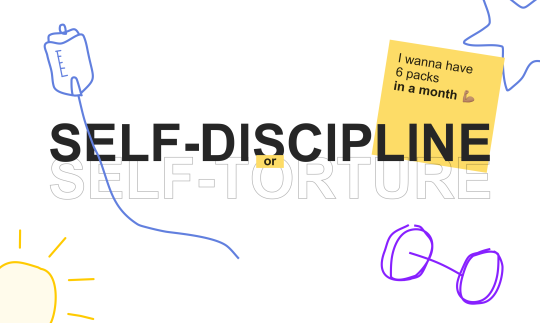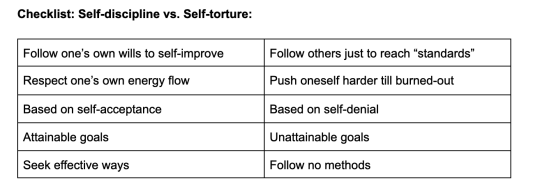Don’t Let the Excessive Self-Discipline Hurt You


What has caused the excessive Self-Discipline?
Bombarded with numerous books and courses aimed at helping us develop self-discipline, together with numerous praises from people around us or on the internet, it seems quite obvious that self-discipline is such a highly-valued quality in today’s society.
This, however, may overstate the significance of being self-disciplined to some extent and may thus pressure us in a way that we easily feel anxious and left-behind if we fail to climb over the “self-restraint mountain” built by so many fabulous examples.
People with such anxiety tend to push themselves harder and harder, to keep pace with those successful examples in this life race. Once their energy is burned out or the willpower collapses, some will fall into an extremely down momentum, thinking they just inertly lack the “self-discipline genes” or completely discrediting being self-discipline itself.
This might explain why even just thinking of self-discipline brings us headaches already. It has been pre-linked with so many negative feelings: toughness, pain, huge effort, discomfort, and shame.
So, is being self-disciplined really a nightmare, or is it just our misunderstandings or stereotypes that make it terrifying?

What does self-discipline really mean?
Being self-disciplined never equals leading a restrictive or punitive lifestyle. Although it seems usually associated with self-control and willpower, it still has to be based on respect to one’s free wills, energy flow, effective methods, and a positive mindset.

Examples & Contrasts:
“I wanna work out regularly to be more healthy.” vs. “Even though I hate the gym, I want 6 packs to be as attractive as xxx on Instagram.”
“I’ll skip the gym because I’m too tired at work today.” vs. “I gotta work out even though my energy is drained already.”
“I’m good enough even though I know there is still space to improve” vs. “I am terrible and I have no choice but to change.”
“Forming a healthy eating to reduce pizzas for meals.” vs. “Cutting pizzas forever off my diet.”
“Forgetting Curve is a useful way to learn new vocabularies” vs. “I can learn as many vocabularies as possible so long as I invest more time.”
Through the checklist, some may come to realize that you're unfortunately in a "self-discipline trap", where you get your heads up and drain yourself all the time, and where any mistakes, failures, and laziness are not allowed. Is this really the way we improve ourselves to reduce anxiety or the way to cause greater stress? I'll leave you to think about it.
In general, even though staying self-disciplined is beneficial for self-improvement and the quality of life, it's never an "everyone-must-do" in life and never means self-torture. On top of it, staying healthy is much much more important.

How can we avoid being over self-restrained?
1. Follow your own energy flow and limit
This simply means when your body tells you that you need rest, then it’s high time you should rest. We all have our energy flow and upper limit. What in return when disobeying it may not be desirable results. For example, sleeping for 5 hours and then forcing yourself to get up for a morning gym sesh. The harm caused by insufficient sleep may overweigh the good brought by the morning workout. Therefore, arranging yourself a work-out when you have enough time and energy to handle it, instead of sacrificing your sleep time just to do it anyway.
2. Follow your own heart instead of others
Information on the internet, especially on social media, has created a hidden competitive environment where numerous "good" examples lead the trends and define what is good and cute. People who see these consciously or subconsciously tend to follow. However, 6-pack isn’t a must, neither is S-shape. Not having them is also not a shame. My suggestion is to listen to your own voice instead of others. Stop self-shaming. Think and identify whether it is what you truly desire or just the illusional self that other people project in your mind.
3. Keep a positive mindset based on self-acceptance
It might sound like a paradox if I don’t deny myself, how can I have the idea to regulate my behavior? Well, try this way: “I accept and love myself, and I also don’t mind making some changes to be better”. For example, "Staying up late often largely affects my work efficiency and also speeds the ageing of my skin. Therefore, I wanna quit this habit because I wish to improve these". This positive mindset that you develop before taking any actions can bring sustainable effects, which helps you enjoy and insist on doing things. Conversely, self-denying, e.g. “I am a whole mess that I sleep late often. My work efficiency is slow and I age fast”, usually brings up a lot of negative feelings, which may be converted to a strong motivation in the beginning, but is usually inconsistent. Once the rush fades, your self-denial is also enhanced.
4. Adjust your goals and expectations
Some who are excessively self-restrained may also face the situation that their goals and expectations are too ambitious. This normally comes in two ways: First, they never stop till it’s perfect, despite the fact that nothing is perfect. Second, they establish an ambitious goal for themselves. The more unachievable it seems, the more fulfilled they will feel.
For example, losing 10 pounds in a week, quitting smoking immediately, and cutting pizza forever off the diet. It then easily goes into an unbalanced and unhealthy cycle that they always set goals but never reach them, no matter how hard they’ve tried. Plus, every time bad habits come back 10 times stronger than before as a payback.
My suggestion is:
* Perfectionism is a fallacy.
* Attainable is more important than ambitious.
* Huge success always comes from small steps through time.
Therefore, instead of setting a goal that you'll never reach, why not creating an attainable target and divide it into multiple smaller ones? To go further, you can also schedule them into daily activities with the help of TickTick.
5. Working smart instead of working hard
Finding more effective and efficient methods is also another way to avoid self-torture. We might all have ever been stuck in the situation that no matter how much effort we’ve made, the progress is just sluggish. Some went further by devoting endlessly. But, reflecting on it, have you found better ways to do it instead of just trying harder?
For example, if I have a goal of learning 20 vocabularies each day when picking up a new language, I might follow the Forgetting Curve to improve the efficiency of memorizing these vocabularies. In another case, when working from home, I tend to use the Pomodoro Technique to maintain a work-life balance and enhance productivity.
Be careful, sometimes when you feel you’ve been “super self-disciplined”, you may just be “less productive”. Like what Henry Ford said, “Improved productivity means less human sweat, not more.”

Takeaways:
Self-discipline doesn’t have to be associated with discomfort, pain, or depression. Therefore, when establishing the healthy habit of being self-disciplined, please remember:
* Follow your own energy flow and limit
* Follow your own heart instead of others
* Keep a positive mindset based on self-acceptance
* Adjust your goals and expectations
* Working smart instead of working hard